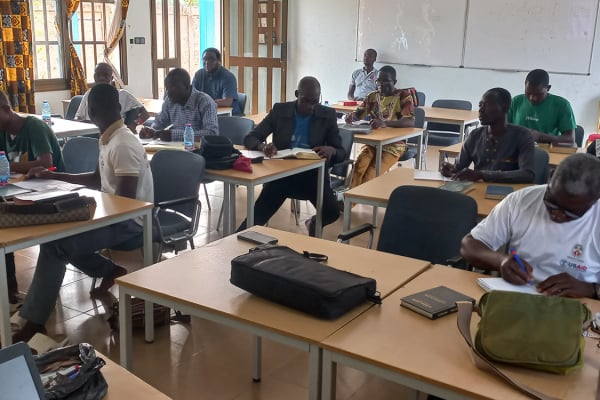
From Hello to Heart: The Missionary's Guide to Learning a Foreign Language
When I travel to other countries, I’m consistently amazed at how often English is spoken. People on the streets are eager to practice a friendly “Hello, how are you?” Menus and signs often have English options. And if you get stuck somewhere, asking “Does anyone speak English?” almost always produces a ready helper.
It’s easy to get by with English while you’re on vacation or a short-term mission trip. But if you’re considering becoming a full-time missionary, don’t overlook the importance of learning the foreign language of the country you’ll call home.
Language touches every part of our lives — from everyday errands to clearing up misunderstandings, sharing emotions, and connecting deeply with the heart of another person.
Your willingness to learn the heart language of your host country reflects cultural awareness and humility.
Learning a foreign language as part of your missionary journey is not primarily about surviving in your new location, but about communicating effectively and building heart-level discipling relationships.
Your willingness to learn the heart language of your host country — which is not an easy task — reflects a cultural awareness and a humility to “become like” the people you’re seeking to reach with the gospel.

 Considering missions? Download our free guide, “Am I Called to Missions?” to help you discern God's leading.
Considering missions? Download our free guide, “Am I Called to Missions?” to help you discern God's leading.

What is a heart language?
A heart language bonds a people group together with a shared source of cultural history and identity. Unlike a trade language, which may be used in business but not in the home, a heart language allows deep and intimate connection and provides the highest level of significance and comprehension.
Nelson Mandela once said, “When you speak a language, English, well many people understand you, including Afrikaners, but when you speak Afrikaans, you know you go straight to their hearts.”
You may be able to get by with English or with limited local language skills, but you won’t be an effective disciple-maker. Our task to make disciples of all nations demands comprehension through a deep and intimate connection — the hallmark of the heart language.
Why is it important to learn the heart language?
“When the gospel is presented in someone’s heart language, it communicates essential things above and beyond the information you want them to receive,” says the website of The Jesus Film, which aims to deliver the story of Christ in every language. “It lets them know that you ‘see’ them and value their culture, that you value their identity. This actually makes them more receptive to the truth you want to share with them.”
A Crossworld worker in North Africa recently experienced this first hand. She told this story.
I was running late for language school as I put my arm out to call a taxi. The driver asked me in French (the trade language) where I needed to go. He was shocked when I said I don’t speak any French but I do speak a little Arabic. He asked me why I’m learning Arabic instead of French, like most foreigners here do.
I said, “I’m learning Arabic because I think it’s important to show people here that I respect their country and language of the heart. I love your country and the people, and this is a small way I can show that.”
He turned around with his hand over his heart and tears in his eyes and said, “Thank you for learning my language. You are welcome here.”
It’s the heart language we must learn to speak if we hope to be welcomed and to communicate the message of the gospel to the very heart of our friends.
What are the benefits of learning a foreign language?
We’ve already discussed the most important benefit of learning the language of your host culture: connecting deeply with the local people. But there are additional benefits to you personally.
Culture and language are strongly intertwined, so the more you understand the language, the better you’ll understand the culture around you, too.
It’s the heart language we must learn to speak if we hope to be welcomed and to communicate the message of the gospel to the very heart of our friends.
For your own cognitive health, learning a second language improves your memory, increases your attention span, helps you multitask, improves your non-verbal communication, and delays dementia as you age.
Learning a second language (or a third!) is an all-around win.
How to effectively learn a language
I hope by this point you’re convinced you should learn the heart language of the people you’re going to serve. But where do you start?
Most missionary preparation programs include language training or language acquisition. Those programs will go into great detail. For now, here are five language learning tips that will help you in your journey.

- Figure out how you learn.
Are you an auditory or visual learner? Do you like to learn with peers in a classroom setting or do you prefer one-on-one attention from a language tutor? Trying to learn in a method that doesn’t work for you will be ineffective and frustrating. Our training when you join Crossworld to become a missionary includes a language assessment that will determine your learning style so you can get the help you need to succeed. - Don’t be afraid to mess up.
The worst mistake you can make is not making any mistakes at all because you’re too afraid to sound silly. Trust me, you will sound silly. That’s okay! Practice anyway. The sooner you learn to laugh at your mistakes, the sooner you can learn from them and improve your language ability. - Make local friends.
Your local friends will be your biggest allies in helping you become fluent in their language. Find a friend who will politely but truthfully correct your speech. Don’t fall back into speaking English with them (unless you’re trading language lessons). Ask questions, listen, and be eager to learn. - Don’t rush the process.
Many people want to know how to learn a language fast, such as in three months or less. If that’s you, let me encourage you right now to reset your expectations before you arrive on the mission field. There’s no magic method — becoming fluent in a language takes years. You’ll be tempted (and maybe even encouraged) to jump into ministry after a few months of language classes, but I strongly urge you not to do that. Spending even a few years in full-time language study will not be wasted; rather it will help you become more effective in the long run as a minister of the gospel.
“[Language learning] is very rewarding. Every milestone we hit gets us closer to the people we love.”
- Stay focused on your goal.
There will be days you’re frustrated and unable to see progress. Don’t give up. Keep focused on your goal, which is not ultimately being fluent in the language but making heart connections with the people in your host country who need the gospel. A Crossworld worker in Thailand said, “[Language learning] is very rewarding. Every milestone we hit gets us closer to the people we love.”
What can you do now to get a head start?
Want to get started now? There are plenty of things you can do to begin learning a foreign language before you arrive on the mission field.
- Take a beginner foreign language course through a local college or library.
- Find an international friend and ask them to teach you their language.
- Volunteer to teach English to internationals in your city. It might sound counterintuitive, but the more you learn about your own language, the better prepared you’ll be to learn a new one.
- Watch TV shows or movies in another language with English subtitles so you get used to hearing different sounds.
- Download language learning apps like Duolingo and Babbel.
The task of learning a foreign language can be daunting. But it can be done at any age! Your devotion to learning the heart language of your host country will be one of the loudest expressions of the love of Christ in you. And the reward of deep, intimate connection with the local people will be so worth it.

 Considering missions? Download our free guide, “Am I Called to Missions?” to help you discern God's leading.
Considering missions? Download our free guide, “Am I Called to Missions?” to help you discern God's leading.
.png)

 By Natalie M.
By Natalie M.











